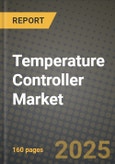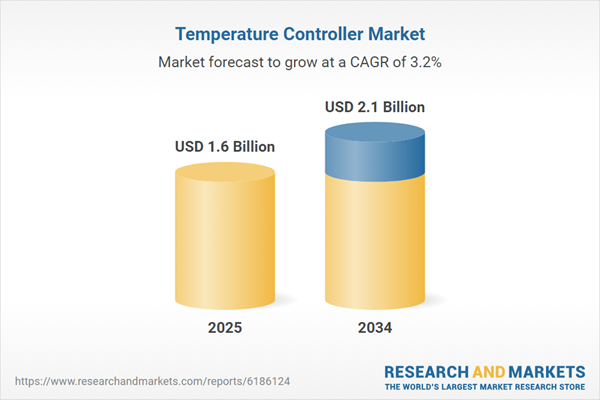The Temperature Controller Market serves as a vital component of process automation and precision control systems across a wide range of industries including manufacturing, food and beverage, pharmaceuticals, chemicals, and HVAC. These controllers are essential for maintaining desired temperature ranges in industrial equipment, environmental chambers, furnaces, refrigerators, and more. Available in various types - such as on/off, proportional (P), proportional-integral-derivative (PID), and programmable models - temperature controllers help optimize energy efficiency, product quality, and system safety. As industries increasingly adopt automation and smart manufacturing frameworks, demand for intelligent, connected temperature controllers has surged. These advanced systems often come with features like real-time monitoring, remote access, self-diagnostics, and integration with industrial control systems like SCADA and PLCs. Leading players including Omron, Honeywell, ABB, Watlow, and Eurotherm are focusing on product miniaturization, enhanced user interfaces, and IoT compatibility to stay competitive in a market that’s evolving rapidly alongside Industry 4.0 trends.
The temperature controller market experienced steady growth supported by advancements in smart factory infrastructure and heightened demand from sectors such as food processing, electronics manufacturing, and pharmaceuticals. Companies prioritized the deployment of PID and programmable temperature controllers that could interface seamlessly with edge devices and cloud platforms for remote monitoring and analytics. Energy-intensive industries upgraded legacy systems to more efficient models to comply with tightening energy regulations and to reduce operational costs. Meanwhile, compact and modular controllers gained popularity in equipment design due to space-saving requirements, particularly in semiconductor manufacturing and lab instrumentation. The medical device sector also contributed to growth, with high-precision temperature regulation needed for sterilization, diagnostic equipment, and cold-chain storage. In addition, user-friendly features such as touchscreens, wireless connectivity, and AI-powered self-calibration were rolled out across new models to meet market demand for flexibility and ease of use. These developments highlighted a shift toward data-rich, adaptive temperature control solutions designed to enhance productivity, traceability, and energy efficiency.
The temperature controller market is poised to enter a new phase of integration and innovation. Controllers will increasingly adopt AI algorithms and machine learning to optimize thermal behavior prediction, fault detection, and autonomous adjustment, particularly in critical manufacturing environments. The trend toward all-in-one control systems - combining temperature, pressure, and humidity monitoring - will grow as industries pursue simplified system architectures and cost efficiency. Growth opportunities will expand in renewable energy and electric vehicle (EV) sectors, where battery management and inverter cooling demand precise thermal control. Environmental sustainability goals will also influence product development, encouraging manufacturers to design low-power and recyclable controller units. Emerging markets in Southeast Asia, Latin America, and Eastern Europe will see heightened demand due to industrialization and expanding infrastructure projects. However, vendors will need to address cybersecurity vulnerabilities in connected controllers, as threats to industrial control systems grow alongside the adoption of IIoT technologies. Success in this space will depend on a combination of performance, reliability, cybersecurity, and cross-system compatibility.
Key Insights: Temperature Controller Market
- Integration of IoT and edge computing capabilities is transforming temperature controllers into smart devices capable of real-time data collection, remote diagnostics, and cloud-based analytics.
- AI-driven self-tuning and predictive maintenance features are emerging, enabling controllers to automatically adapt to process changes and reduce unplanned downtime.
- Touchscreen interfaces and modular design enhancements are improving user experience and simplifying installation in compact or multifunctional systems.
- Multi-loop controllers that manage several temperature zones simultaneously are being adopted in complex industrial and laboratory settings to reduce equipment footprint and wiring complexity.
- Open communication protocols like Modbus, Ethernet/IP, and OPC UA are becoming standard to enable seamless integration with PLCs, SCADA, and MES platforms.
- Rising demand for precision temperature regulation in manufacturing processes is boosting controller adoption to ensure consistent product quality and safety.
- Energy efficiency requirements and regulatory compliance are pushing industries to replace outdated controllers with advanced, low-power alternatives.
- Growth in smart factories and automation projects is increasing demand for digitally integrated temperature control systems compatible with industrial networks.
- Expansion of healthcare, semiconductor, and electric vehicle sectors is creating new use cases that require high-accuracy temperature control technologies.
- One major challenge is ensuring cybersecurity resilience in connected temperature controllers, as growing IIoT integration exposes systems to risks of data breaches, operational disruption, and regulatory penalties if not adequately protected.
Temperature Controller Market Segmentation
By Type
- Analog
- Digital
- Hybrid
By Application
- Temperature Controlling
- Temperature Monitoring
By End-User
- Oil and Gas
- Plastics
- Food and Beverage
- Automotive
- Chemicals
- Energy and Power
- Other End-Users
Key Companies Analysed
- Omron Corporation
- Honeywell International Inc.
- Siemens AG
- Schneider Electric SE
- ABB Ltd.
- Panasonic Corporation
- Yokogawa Electric Corporation
- Autonics Corporation
- Watlow Electric Manufacturing Company
- Delta Electronics, Inc.
Temperature Controller Market Analytics
The report employs rigorous tools, including Porter’s Five Forces, value chain mapping, and scenario-based modeling, to assess supply-demand dynamics. Cross-sector influences from parent, derived, and substitute markets are evaluated to identify risks and opportunities. Trade and pricing analytics provide an up-to-date view of international flows, including leading exporters, importers, and regional price trends.Macroeconomic indicators, policy frameworks such as carbon pricing and energy security strategies, and evolving consumer behavior are considered in forecasting scenarios. Recent deal flows, partnerships, and technology innovations are incorporated to assess their impact on future market performance.
Temperature Controller Market Competitive Intelligence
The competitive landscape is mapped through proprietary frameworks, profiling leading companies with details on business models, product portfolios, financial performance, and strategic initiatives. Key developments such as mergers & acquisitions, technology collaborations, investment inflows, and regional expansions are analyzed for their competitive impact. The report also identifies emerging players and innovative startups contributing to market disruption.Regional insights highlight the most promising investment destinations, regulatory landscapes, and evolving partnerships across energy and industrial corridors.
Countries Covered
- North America - Temperature Controller market data and outlook to 2034
- United States
- Canada
- Mexico
- Europe - Temperature Controller market data and outlook to 2034
- Germany
- United Kingdom
- France
- Italy
- Spain
- BeNeLux
- Russia
- Sweden
- Asia-Pacific - Temperature Controller market data and outlook to 2034
- China
- Japan
- India
- South Korea
- Australia
- Indonesia
- Malaysia
- Vietnam
- Middle East and Africa - Temperature Controller market data and outlook to 2034
- Saudi Arabia
- South Africa
- Iran
- UAE
- Egypt
- South and Central America - Temperature Controller market data and outlook to 2034
- Brazil
- Argentina
- Chile
- Peru
Research Methodology
This study combines primary inputs from industry experts across the Temperature Controller value chain with secondary data from associations, government publications, trade databases, and company disclosures. Proprietary modeling techniques, including data triangulation, statistical correlation, and scenario planning, are applied to deliver reliable market sizing and forecasting.Key Questions Addressed
- What is the current and forecast market size of the Temperature Controller industry at global, regional, and country levels?
- Which types, applications, and technologies present the highest growth potential?
- How are supply chains adapting to geopolitical and economic shocks?
- What role do policy frameworks, trade flows, and sustainability targets play in shaping demand?
- Who are the leading players, and how are their strategies evolving in the face of global uncertainty?
- Which regional “hotspots” and customer segments will outpace the market, and what go-to-market and partnership models best support entry and expansion?
- Where are the most investable opportunities - across technology roadmaps, sustainability-linked innovation, and M&A - and what is the best segment to invest over the next 3-5 years?
Your Key Takeaways from the Temperature Controller Market Report
- Global Temperature Controller market size and growth projections (CAGR), 2024-2034
- Impact of Russia-Ukraine, Israel-Palestine, and Hamas conflicts on Temperature Controller trade, costs, and supply chains
- Temperature Controller market size, share, and outlook across 5 regions and 27 countries, 2023-2034
- Temperature Controller market size, CAGR, and market share of key products, applications, and end-user verticals, 2023-2034
- Short- and long-term Temperature Controller market trends, drivers, restraints, and opportunities
- Porter’s Five Forces analysis, technological developments, and Temperature Controller supply chain analysis
- Temperature Controller trade analysis, Temperature Controller market price analysis, and Temperature Controller supply/demand dynamics
- Profiles of 5 leading companies - overview, key strategies, financials, and products
- Latest Temperature Controller market news and developments
Additional Support
With the purchase of this report, you will receive:- An updated PDF report and an MS Excel data workbook containing all market tables and figures for easy analysis.
- 7-day post-sale analyst support for clarifications and in-scope supplementary data, ensuring the deliverable aligns precisely with your requirements.
- Complimentary report update to incorporate the latest available data and the impact of recent market developments.
This product will be delivered within 1-3 business days.
Table of Contents
Companies Mentioned
- Omron Corporation
- Honeywell International Inc.
- Siemens AG
- Schneider Electric SE
- ABB Ltd.
- Panasonic Corporation
- Yokogawa Electric Corporation
- Autonics Corporation
- Watlow Electric Manufacturing Company
- Delta Electronics Inc.
Table Information
| Report Attribute | Details |
|---|---|
| No. of Pages | 160 |
| Published | October 2025 |
| Forecast Period | 2025 - 2034 |
| Estimated Market Value ( USD | $ 1.6 Billion |
| Forecasted Market Value ( USD | $ 2.1 Billion |
| Compound Annual Growth Rate | 3.1% |
| Regions Covered | Global |
| No. of Companies Mentioned | 10 |









